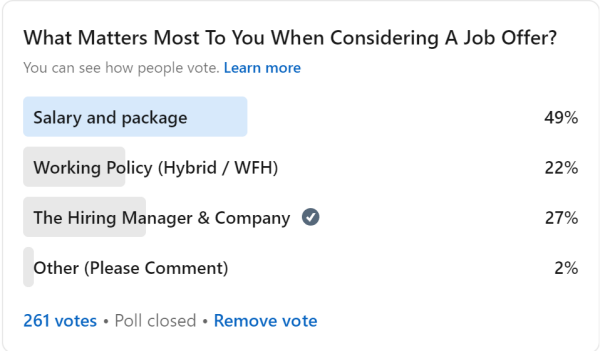In the evolving world of the modern workplace, there's been a growing chorus about the importance of flexible schedules, work-life harmony, and meaningful work. Yet, when push comes to shove, what truly tips the scales for job seekers? According to a recent poll I conducted, the resounding answer is still—undeniably—compensation.
The Currency of Choice: Salary and Package
The poll, which garnered 261 votes, revealed a telling trend: 49% of respondents declared salary and benefits as their top priority when considering a new job offer. This substantial figure eclipses the 22% who value working policy, including hybrid and remote options, and the 27% who consider the hiring manager and company culture paramount. A mere 2% cited other factors, underscoring the somewhat surprising reality that despite extensive discussions about the evolving benefits landscape, cold hard cash is what speaks loudest to the majority.

Perks vs. Paychecks
While the allure of flexible working arrangements and a vibrant company culture cannot be overstated, they often play second fiddle to the more tangible metric of money. This isn't to say that non-monetary perks are inconsequential. On the contrary, they are significant, but as our data suggests, they are not the primary motivator. This raises a question: Are we, as a workforce, wired to prioritize financial security above all else?
Decoding the Job Market Dynamics
The current economic climate, marked by inflation and cost-of-living adjustments, might be a key driver behind this trend. In such an environment, the immediate need for financial stability could overshadow the long-term benefits of other job perks. It's also possible that salary, a clear and quantifiable factor, is simply easier for job seekers to navigate and compare than the more nebulous concept of 'company culture' or 'flexible hours'.
The Psychological Payoff of Pay
Psychologically speaking, salary has always been a straightforward indicator of success and security. Rooted deeply in Maslow's hierarchy of needs, financial remuneration not only satisfies our basic requirements but also fulfills higher-level desires for esteem and self-actualization. It is a clear, universal scorecard that crosses cultural and social lines.
What This Means for Employers
For employers, the message is clear: while it's important to foster a supportive work environment and offer flexible work arrangements, competitive financial compensation should not be sidelined. The talent market is listening, and they're telling us that while they appreciate the bells and whistles, it's the numbers on their paycheck that often have the final say.
In Conclusion
As we navigate the complexities of the job market, it's important to remember that the more things change, the more they stay the same. Salary, it seems, has retained its throne in the kingdom of job offer considerations. This isn't to diminish the value of other job benefits, but rather to highlight the enduring power of the paycheck. In a world where 'cash is king', how might employers and employees alike balance the scales between monetary and non-monetary job incentives? The dialogue continues, and it's one that we must engage in with open minds and balanced expectations.
